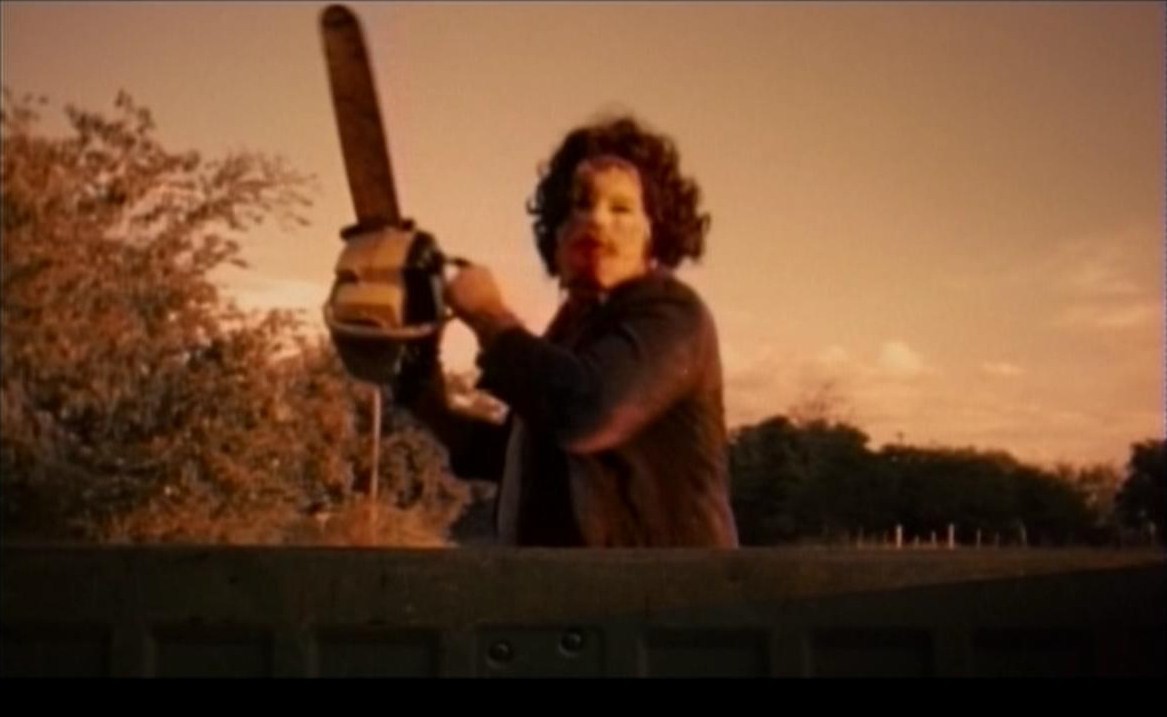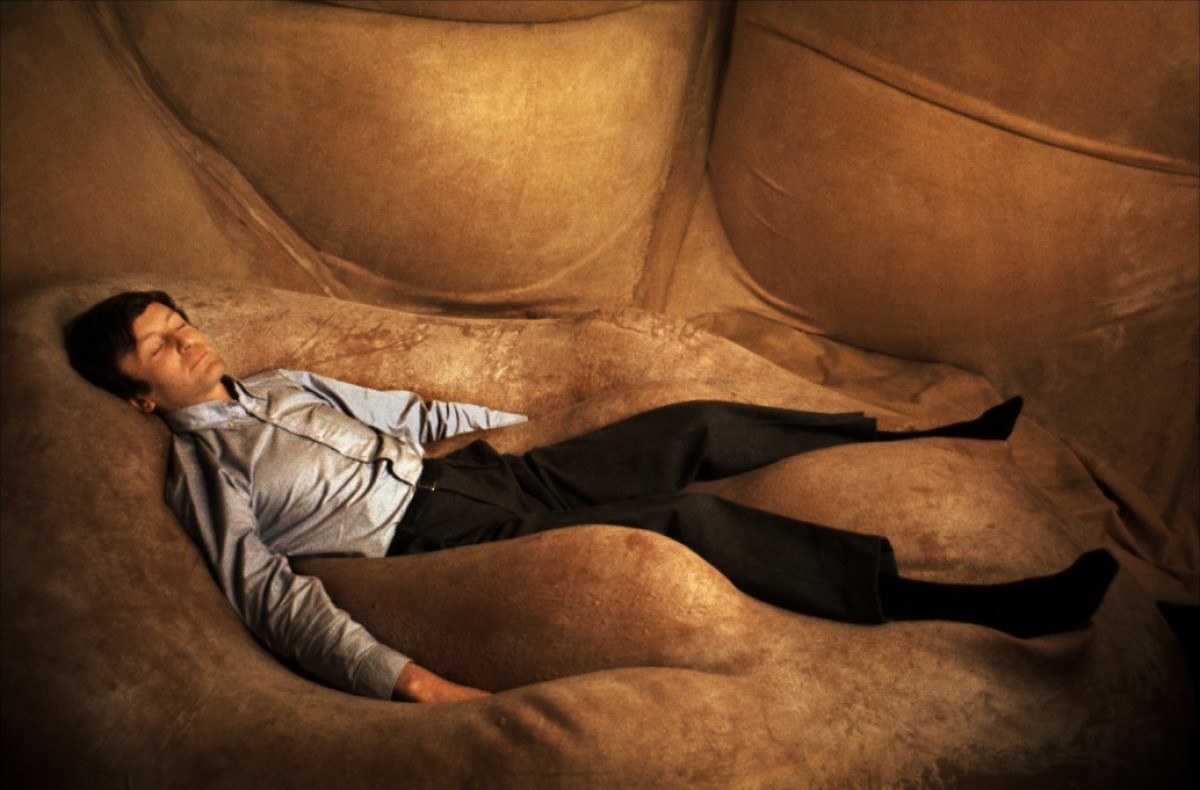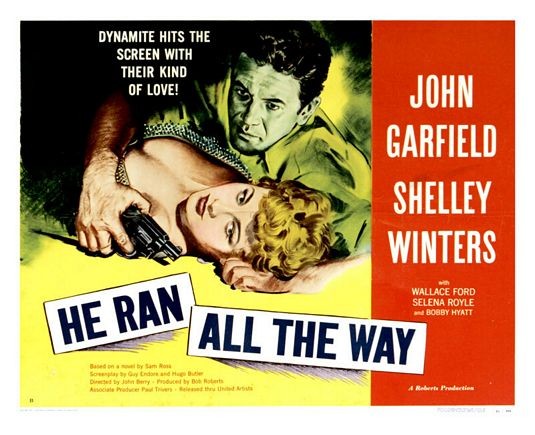
The Texas Chainsaw Massacre (1974; dir. Tobe Hooper)—I spent last Saturday night in an ill-lit movie theater with a bunch of misfits, longhairs, punks, and a guy in a Leatherface costume. Why? To see the special 40th anniversary restoration of Tobe Hooper’s notorious horror classic, of course. It’s strange to watch a cleaned-up digital print of something that used to look like it had been dredged up from a swamp. But in its shiny new restoration, it’s impossible to miss all the chicken feathers, rotten flesh and furniture made from human bones, and Hooper’s knack for juggling long shots and extreme close-ups benefits from the digital smoothing-out. The film’s many shocks are well and truly sprung, and it’s also I-guess-you-could-call-it-funny in spots; an early scene where a wheelchair-bound weirdo absently chews a sausage is quietly nauseating for anyone who’s seen the movie before. The film’s final 30 minutes, a nightmare of familial derangement and extreme psychic trauma, is overpoweringly loud and uncomfortable, and it’s the key to this absolutely horrifying and sickening experience that, honestly, I never want to see again. Grade: A+
Film Journal #7
Women Aren’t Funny (2014; dir. Bonnie McFarlane)—Last week’s episode of IFC’s Garfunkel & Oates was predicated on the idea that women aren’t funny, a pernicious lie that might be laid to rest after it’s been proven false 700 more times. I looked up this movie on iTunes after I saw director/star/comedian Bonnie McFarlane’s stand-up set ignominiously cut short on The Late Show With David Letterman a month ago. What gives, man? I was hoping for a more legitimate inquiry into a complex, messed-up, industry-wide misconception that persists in spite of the work of Tina Fey, Amy Poehler, Amy Schumer, the Broad City girls, Morgan Murphy, Jen Kirkman, Maria Bamford, Jenny Johnson, Casey Wilson, Mindy Kaling, etc. etc. etc. Unfortunately, McFarlane is too much of a prankster and a serial ironist to truly and fully confront sexism in comedy. (Relying on Artie Lange doesn’t help.) Still, there are some jokes and some revealing observations here, and wisdom and enlightenment come from two unlikely sources: Sarah Silverman, who’s always welcome in anything, and Todd Glass, who I saw open for Louis C.K. twice and who never made me laugh once. It’s inconceivable to me that McFarlane’s husband, comedian Rich Vos, is a bigger name than she is, but that’s just part of the problem. Women can’t get no respect. What do I know, though? I’m just a sex-positive feminist who’s heading to a Garfunkel & Oates show on Friday night. Grade: B
Film Journal #7 (2)
Pharoah (1965; dir. Jerzy Kawalerowicz)—An ancient Egyptian sword-and-sandal epic with real swords, real sandals, real sand, and crowds of real extras, Kawalerowicz’s long, solemn, deliberate film about the rise to power of Ramses XIII contrasts smug, impassive authority figures with scurrilous hustlers and balances regal scrolling tracking shots in the royal chambers with ragged, jagged handheld vignettes in the streets and the desert. One battle scene is shot entirely from the point of view of a footsoldier who doesn’t make it back; another claustrophobic set piece watches a sweat-grimed man slowly lose his way in a labyrinth. There’s betrayal, mysticism, a solar eclipse, and a foxy grey-skinned temptress who feels like she’s been imported from a Mesopotamian skin flick. In other words, it’s another helpful reminder of the rest of the world’s cinematic riches. In addition to being available on DVD, Pharoah is one of the highlights of Martin Scorsese’s “Masterpieces of Polish Cinema,” series, which has screenings in Kansas City and Atlanta later this fall. Grade: A-

Je t’aime Je t’aime (1968; dir. Alain Resnais)—Watching an Alain Resnais movie from the 1960s is one of the more exciting and rewarding cinematic challenges you can set for yourself. They resist easy categorization and they demand your full attention; they’re puzzling and provocative and more or less impossible to take the measure of after just one viewing. These movies take time: once you can trace the through-line of the plot, the rhythms of the editing move to the forefront, and new thematic concatenations begin to emerge from the headspace between shots. Avoid these if structural ingenuity isn’t your thing. Anyway, in this film—which anticipates Eternal Sunshine of the Spotless Mind by 35 years—a suicidal author is asked to participate in a time-travelling experiment. So some scientists put him in a contraption that suggests a giant head of garlic and set him loose. Things don’t go smoothly. In the best scene, our hero sits in an office and contemplates his place in the universe. I bet if he looked into a coffee cup just then, he’d probably see the Milky Way in the cream. Grade: A- (but likely to improve after multiple viewings)

He Ran All The Way (1951; dir. John Berry)—After surfacing briefly on TCM.com for a week, this excellent film noir has disappeared into the digital depths on Monday; if you want to see it, you need a multi-zone DVD player and a decent chunk of change. For the casual moviegoer, it’s probably not worth the trouble; for fans of raw domestic melodrama, the cinematography of James Wong Howe, and Marlon Brando’s performance in A Streetcar Named Desire (which was released the same year), it’s probably a must-see. John Garfield, in his final performance, plays an unlucky hoodlum who botches a robbery and hides out from the law by escaping into a public pool. He seduces Shelley Winters while he waits for the heat to lift, and he eventually cons his way back to Winters’ place, where he winds up holding her, her kid brother, and her mom and dad hostage. Garfield lurches around the family’s apartment like an ape and kills time by mocking and terrorizing middle-class rituals—family meals, day jobs, first loves. His volatile anger and flashes of need are inseparable; it’s no wonder that Winters—who, at this stage in her career, played lots of girls with lousy taste in men—is drawn to him. Terse, tense, terrific, and only 78 minutes long. Grade: A